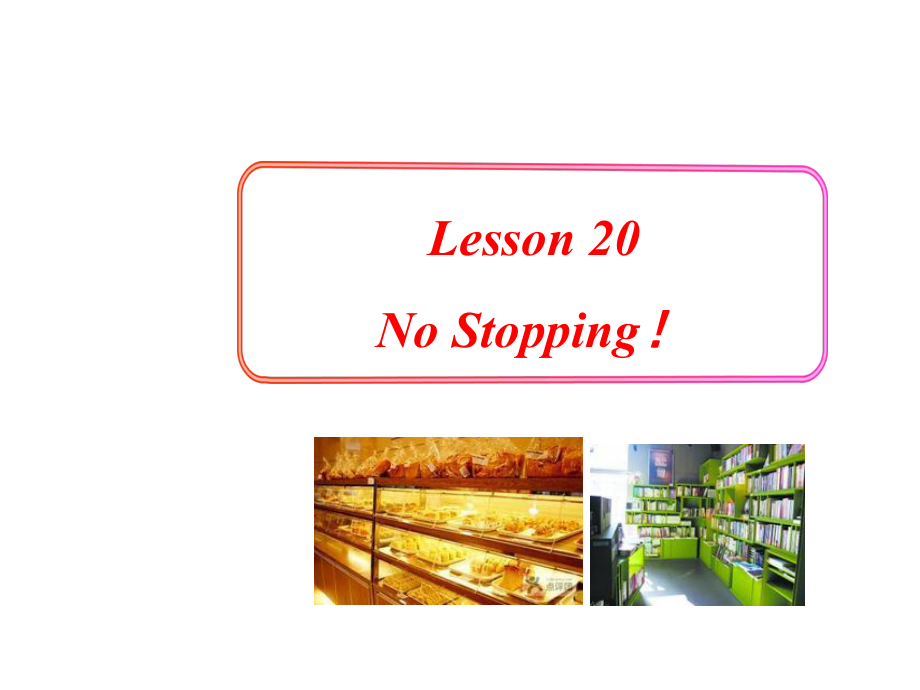《甘肅省酒泉市第三中學(xué)八年級英語上冊 Unit 4 Lesson 20 No Stopping課件 (新版)冀教版》由會員分享����,可在線閱讀�,更多相關(guān)《甘肅省酒泉市第三中學(xué)八年級英語上冊 Unit 4 Lesson 20 No Stopping課件 (新版)冀教版(21頁珍藏版)》請?jiān)谘b配圖網(wǎng)上搜索����。
1、Lesson 20No Stopping�!Lead inLook at the pictures. What places do Jenny and Brian pass on their way to school?bakery 面包店 biscuit n餅干1.Where are Jenny and Brian?On their way to school.2.What does Jenny want to do?Jenny wants to show Brian the neighbourhood.3.What stores do they see on the way?Bakery a
2����、nd bookstore.Listen and answer : Questions Brian Jenny1 Which store do Brian and Jenny want to stop? 2 What kind of things are there in the shops? 3 Why do they like it? bakerybookstorebreadcakesdonutsmany good things to readhungryfavouriteCan they stop at the shops?No. Because they dont want to be
3、late for school.Read the text and answer Jenny and Brian are _(在去學(xué)校(在去學(xué)校的上的上). They are walking because its sunny. Brian says they usually _ (乘校班車乘校班車).Jenny says she wants to show Brian the neighbourhood.They come to a corner. Brian asks “Do we _ (走這條路走這條路) now?” Brian is _(指向)指向)the right. Jenny s
4�����、ays “no, _(向左轉(zhuǎn)(向左轉(zhuǎn))”.The they look left,_ (向右看看向右看看) and _ (穿過街穿過街道道).Jenny says she likes going this way because they can go past some of Jennys favourite shops.on their way to schooltake the school busgo this waypointing toturn leftlook rightcross the streetgo/walk past/bybread, cakes and donutspa
5��、ssbookstoreso many good things to readSoon, they_ (經(jīng)過經(jīng)過)a big store window. Brian stops. He sees _. Brian feels hungry and wants to buy something.Jenny doesnt want to be late for school and tell Brian not to stop. But they _(經(jīng)過經(jīng)過) another window, Jenny stops because _ (書店書店) is her favourite store.
6�����、It has _ (許多可以讀的好書許多可以讀的好書). Language notesPresentation1.No stopping! 不要停下來不要停下來! no加上名詞或加上名詞或v-ing 可以構(gòu)可以構(gòu)成表示禁止性的警示語����。成表示禁止性的警示語。 eg. 禁止吸煙禁止吸煙! No smoking! 禁止停車禁止停車! No parking! 謝絕參觀謝絕參觀 ! No visitors!2. Jenny and Brian are on their way to school. on ones/the way to 意思是意思是“在去某地的路上在去某地的路上” eg. 我在上學(xué)的路上
7����、遇見我的老朋友�。我在上學(xué)的路上遇見我的老朋友���。 I met my old friend on my way to school. 我經(jīng)常在回家的路上買些吃的我經(jīng)常在回家的路上買些吃的�。 I often buy some food on my way home.3. Usually we take the school bus (乘學(xué)校班車)乘學(xué)校班車). take a bus 和和 by bus 意思都是意思都是“乘公共汽車乘公共汽車”前者前者是動詞作謂語是動詞作謂語,后者是介詞短語作狀語����。后者是介詞短語作狀語。 eg. 我乘公共汽車去超市����。我乘公共汽車去超市。 I take a bus to
8���、 the supermarket. 我乘公共汽車去上學(xué)我乘公共汽車去上學(xué)�����。 I go to school by bus.4. We will go past some of my favourite shops. past 用作介詞用作介詞, 和動詞連用和動詞連用,表示表示“經(jīng)過經(jīng)過” �����。 eg. 我經(jīng)常走過那個(gè)花園�。我經(jīng)常走過那個(gè)花園。 I often walk past the garden. 她昨天七點(diǎn)鐘走過那家商店�����。她昨天七點(diǎn)鐘走過那家商店��。 She went past the bookstore at seven yesterday. 5. Soon, they walk pass
9�����、a big store window. pass 用作動詞用作動詞,意思是意思是“經(jīng)過經(jīng)過” ���。eg. 當(dāng)你走過那家商店時(shí)當(dāng)你走過那家商店時(shí),你能買到一些水果。你能買到一些水果��。 You can buy some fruits when you pass the shop. pass 相當(dāng)于相當(dāng)于 go past , walk past, go by, walk by passed 的發(fā)音與的發(fā)音與 past /pa:st /相同��。相同����。6. cross 是動詞是動詞, across 是介詞是介詞,不能單獨(dú)作謂語不能單獨(dú)作謂語,但可以和但可以和動詞搭配使用動詞搭配使用。意思是意思是 “橫穿橫穿
10�����、” 。 eg.當(dāng)交通燈紅的時(shí)候當(dāng)交通燈紅的時(shí)候,我們不能橫穿馬路我們不能橫穿馬路�����。 We cant cross the road when the traffic light is red. We cant go across the road when the traffic light is red.ayornerastrossookstoreseighbourhoodtop考考你的記憶力考考你的記憶力1.They met the old man on their w_ to school.2. Li Mei is sitting in the c_ of the room.3. I go
11��、 p_ the post office every day.4. Dont c_ the road when the light is red.5. There are many books in the b_.6. Please show me your n_.7. Lets s_ to have a rest.1. Ill tell her the news, when I _ her house. A. past B. pass C. cross D. across2. My bike was broken _. A. on my way to home B. by the way ho
12�����、me C. on my way home3. I cant go to a movie with you_ I feel sick. A. why B. because C. so D. andPractice.單項(xiàng)選擇單項(xiàng)選擇4. I havent met _ people. A. such many B. such much C. so many D. so much5. Hurry up! I dont want to _ meeting. A. be late to B. be late for C. late to D. late for6. We need a place _ ki
13��、tes. A. fly B. flies C. flying D. to fly 7. Li Lei is walking. He is _ his way _ home. A. for, / B. on, to C. at, to D. on, / 8. You need to _ the street to get there. A. across B. past C. pass D. cross 9. They walk _ a big store window. A. pass B. past C. passes D. passing 10. She is _ a bus to the
14����、 bookstore. A. having B. painting C. taking D. bringing . 根據(jù)首字母或漢語提示寫出所缺單詞根據(jù)首字母或漢語提示寫出所缺單詞 1.He walked round the_(拐角拐角)into the next street. 2.Brian is_(指著指著) to the right and asks, “Do we go this way now?” 3.There is a fruit shop in my_(街區(qū)街區(qū)). 4.They met the teacher on their w_to school.5. There ar
15、e too many books in the b_.6. It is s_ today. Why not go out for a walk? corner pointing neighbourhoodayooksores unny_.選擇恰當(dāng)?shù)脑~完成句子選擇恰當(dāng)?shù)脑~完成句子. 1. Chen Hong went _(pass, past) the bookstore and bought a map. 2. Let him _(look, look at) all the foods in the window.3. Please go _(across, cross, crossing)
16��、 the street, the park is on your left.4. No _ (talk , talking), please.5.We can see many trees on _ (our, us) way home.to dois crossingto telltheirpasses6.I have so many things _ (do).7.Look, the dog _ (cross) the street.8.Do you want _(tell) me anything about your school?9.Look, the children are on
17�����、 _(they) way home.10.The girl _ (pass) the shop every day.HomeworkHow do you get to school? You can use the following expressions: come to the corner, turn left , cross the street , turn right, get to school��,and on my way to school, _. I see _, I like_ best because I_ .Write a passage about it.A leopard cannot change its spots.積習(xí)難改。
 甘肅省酒泉市第三中學(xué)八年級英語上冊 Unit 4 Lesson 20 No Stopping課件 (新版)冀教版
甘肅省酒泉市第三中學(xué)八年級英語上冊 Unit 4 Lesson 20 No Stopping課件 (新版)冀教版

